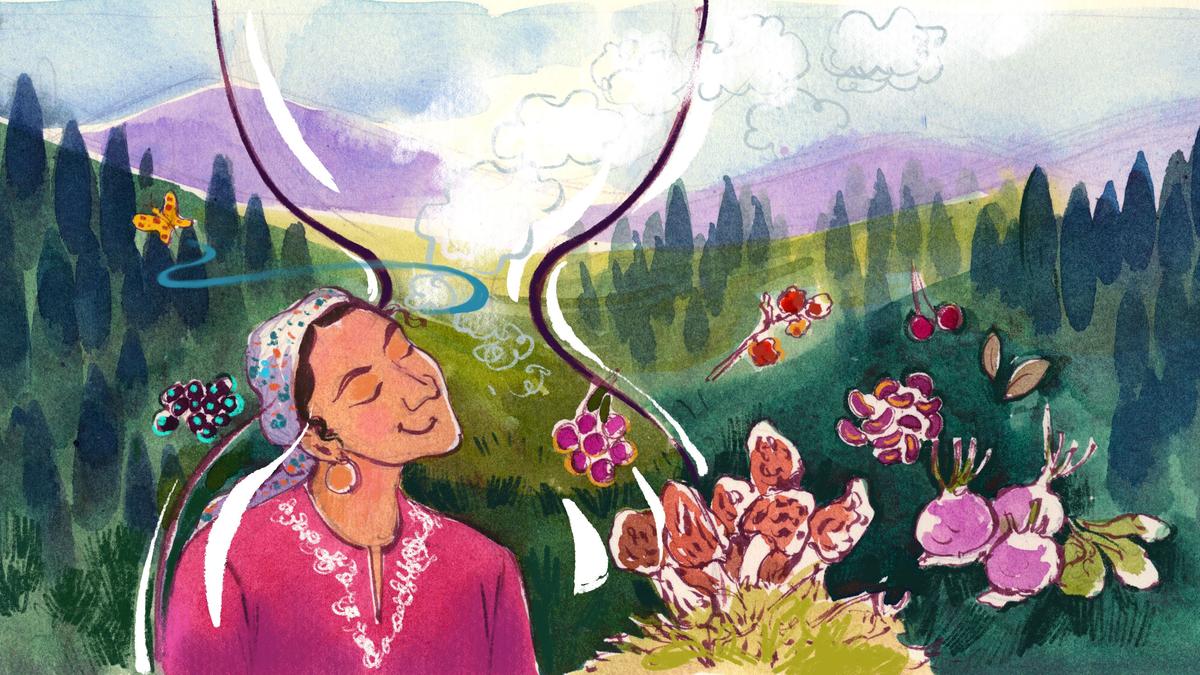When things got a little intense for Phuphee and she needed a breather, she would drop what she was doing and go for a walk. She would throw on her keep (upper section of a Kashmiri burka), grab a small basket and knife, and walk into the nearby forest. At the door, before she said goodbye, she would say, ‘Zangan chem beqaraeri [my legs have anxiety]’. We would see her a couple of hours later, a little flushed but brighter and cheerful.
I have been told by other members of the family that when she got married, and started taking these ‘solo’ trips, her in-laws became very concerned and sent for her grandmother (her mother had passed away when she was young). It is said that Aapa told them that Tahira’s spirit needed rest away from humans and that they should never think about interfering with it. And so, it was never brought up again.
Phuphee would go off and spend the time she needed with the fairies, and what made it more acceptable, though somewhat inconvenient (as everything stopped functioning when she left the house), was that she always came back with a basket full of treats. She would bring back gucchhi mushrooms, berries, seeds, nuts and wild vegetables. One day, she brought back wild turnips.
‘Sessar gogji ranov [let’s make slow-cooked turnips with red kidney beans]’. This is a dish that takes three days to prepare. First the kidney beans are slow-cooked for a couple of days and then the turnips are added and left to cook on the embers for another day. It is a labour of love. The result is a nourishing mixture that she would serve with hot rice.
When Phuphee made sessar gogji she would always use a special kind of kidney beans that she brought from a village called Madvewadwun. She would go to this village, which was many miles away, when she needed an extended breather. It would take days for her to cover the distance. She had a close friend who lived there, an old woman said to possess strong magical powers and immense wisdom, who lived on her own.
Phuphee would spend a week with her and together they would go to the hot sulphur springs called Tatta Paani. It is said that a dip in the healing waters could cure sickly joints, two dips could cure broken bones, and three dips, a broken heart.
Her trip to Tatta Paani was never planned. She would announce it a day before or sometimes on the morning that she was leaving. In the first year of her marriage, her mother in-law refused to let her go, stating that her responsibility now lay in the marital home. It is said that within a couple of hours of Phuphee being forbidden to leave, clouds gathered over the village (it was mid-July) and it rained non-stop for six days. It only stopped when Phuphee’s mother-in-law, having understood the source of the storm, begged her to take her trip.
I asked Phuphee once if all these stories about her were true. She simply smiled and said, ‘One day you will inherit all this,’ pointing to her brain and heart, ‘and all will become clear to you.’
Once, I was sitting on the verandah with her, eating toasted gucchis. I asked her how many dips she took when she visited Tatta Paani. ‘Are you trying to figure out if I go for sickly joints or a broken heart?’ she replied.
I smiled sheepishly, trying to hide my embarrassment at being caught in an attempt to be clever.
‘I don’t always go to the hot spring. Usually, I just spend time with my friend. We sit, and she cooks for me. When I am with her, I never cook or do any work. I rest. I rest my body, my mind and my soul. When I was little, I was taught to cook and clean and look after everyone else. There were times when I would feel so exhausted that I would fall asleep every few minutes. On one occasion, I nearly let the house burn down because I had fallen asleep while cooking. It was then that Aapa told me that my soul had been emptied and I needed to refill it. She sent me to Tatta Paani to see my friend. I stayed with her for a week and when I felt that my soul was full again, I came back. Aapa told me that whenever I felt like this again, I must go,’ Phuphee explained.
‘So how do you know when you need to go? How do you know your soul has emptied?’ I asked, a little confused.

‘I love cooking and I love treating the people who seek my help. These are two things that bring my heart tremendous peace and joy, but when my soul is nearly empty, the feelings of joy and peace are replaced by those of dread and anxiety. That is when I know I need to rest. If I ignored my own calls of help, how could I ever do justice to anyone else?’
She took two cigarettes and smoked them in silence while I sat there thinking about the important lesson she had just taught me — about how it wasn’t just food that nourished you, but also rest. She taught me how to recognise the signs of a soul that needed refilling and how to honour that need.
Even today, when I need a breather, I walk out the front door, whispering under my breath, ‘Zangan chem beqaraeri’ and disappear for a little while.
Saba Mahjoor, a Kashmiri living in England, spends her scant free time contemplating life’s vagaries.

